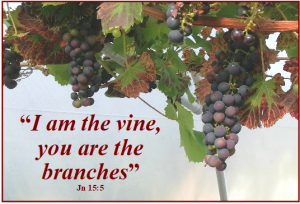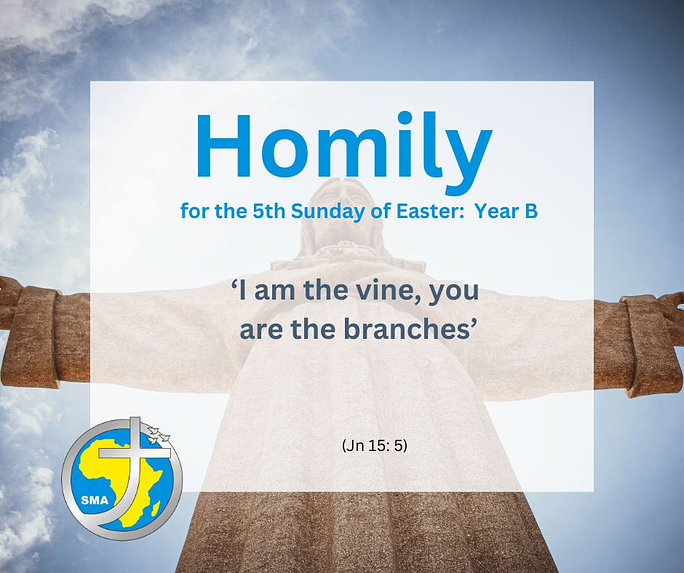Readings: Acts 9:26-31; 1 John 3:18-24 3:18-24; John 15:1-8
Theme: ‘I am the vine, you are the branches’ (Jn 15:5)
The context of today’s gospel reading is Jesus’ long discourse to his disciples at the Last Supper. While fully aware of his enemies’ determination to destroy him, Jesus’ concern is not for himself but for his disciples. He wants to prepare them for the challenges they will face in bearing witness to him and continuing his mission. Throughout John’s Gospel Jesus uses images, such as Light, Bread, Shepherd, to convey his message. In today’s gospel reading he uses an image familiar to his disciples: the image of the vine and the branches.
Culturally and economically the cultivation of vines was as important in Israel as the cultivation of potatoes was (and still is) in Ireland. Several passages in the Hebrew Scriptures refer to the people of Israel as a vine, planted and cared for by God and destined to produce wholesome fruit. Sadly, this particular vine fell far short of the expectations of the gardener (God). In the words of the prophet Isaiah, ‘He (the Lord) ploughed the land and cleared it of stones. Then he planted it with the choicest vines, built a watchtower in the middle of it, and dug a wine vat in it; He expected it to produce good grapes, but it produced only wild ones’ (Is 5:2).
In today’s gospel Jesus applies the image of the vine to himself and his relationship with his disciples. Jesus is the vine, and we are the branches. Without the nourishment, moisture and support offered by the vine, the branches wither and die. This means that our lives must be rooted in Christ – a truth we may find hard to accept at a time when self-reliance, independence, and self-assertion are promoted as the supreme values. Nowadays, we are encouraged to create our own identities. We are told that we are what we make of ourselves. It is, of course, true that we can, and must, shape and direct our lives. But the image of Christ, the vine, reminds us that we are loved, sustained, redeemed, and sanctified through the person of Christ, and that, cut off from him, we are, quite simply, good for nothing (cf. Jn 15:5).
The image of the vine teaches us that, just as the vine sustains the branches, enabling them to bear fruit, so too Christ sustains and nourishes us, so that we will be fruitful. And, just as the best fruit comes from careful pruning, so we, too, need pruning from time to time. We may have developed habits that are harmful in our lives, unwanted growths that sap our energy, and diminish our fruitfulness. Jesus tells his disciples: ‘You are pruned already by means of the word I have spoken to you’. When we listen attentively to the Word of God and let take root in us, we are pruned to become stronger, healthier, and more fruitful branches of the true vine.
The image of the vine also illustrates that Christ needs us. We are the branches, and it is the branches that bear the grapes. In the oft-quoted words of St Teresa of Avila: ‘Christ has no body now but yours, no hands, no feet on earth but yours; yours are the eyes with which he looks compassion on this world; yours are the feet with which he is to go about doing good; and yours are the hands, with which he is to bless us now.’ Yes, Christ depends on us to be fruitful – to produce the fruits of love in the world for which he laid down his life. However, being fruitful must not be equated with being successful, or at least what is often seen as success in our materialistic world. Christ is not asking us to be successful or famous, but to be fruitful. This means letting the love we constantly receive from him flow through us, and out to others for their benefit, and this is something that may often go unheralded and unrewarded.
The secret of bearing fruit is ‘remaining in’ Christ – a phrase that is repeated several times in today’s gospel passage. ‘Remaining in’ Christ is much more than the keeping of rules, though this is not unimportant. It means living in an intimate ‘I-thou’ relationship with Christ who has made his home in us (Jn 15:4) Ultimately it means living in love, the same love that unites the Father and the Son: ‘As the Father has loved me, so I have loved you, remain in my love’ (Jn 15:9). I end with a poem by Malcolm Guite, entitled ‘I am the Vine’, in which he invites us to consider what it might feel like to be part of the vine.
 How might it feel to be part of the vine?
How might it feel to be part of the vine?
Not just to see the vineyard from afar
Or even pluck the clusters, press the wine,
But to be grafted in, to feel the stir
Of inward sap that rises from our root,
Himself deep planted in the ground of Love,
To feel a leaf unfold a tender shoot,
As tendrils curled unfurl, as branches give
A little to the swelling of the grape,
In gradual perfection, round and full,
To bear within oneself the joy and hope
Of God’s good vintage, till it’s ripe and whole.
What might it mean to bide and to abide
In such rich love as makes the poor heart glad?

